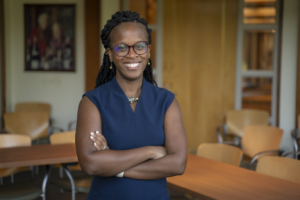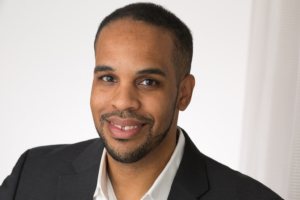Episode Summary:
Today we dive deep into Section 3 of The Pandemic Divide: COVID-19 and Financial Disparities, with guests Fenaba Addo and Chris Wheat, and hosted by Dr. William “Sandy” Darity. Fenaba Addo and Chris Wheat discuss the financial implications of the pandemic for student loan debt. Addo explains that, because of the pandemic, student loan debt became a central issue for many Democratic presidential candidates. As a result, the policy responses to the pandemic included a moratorium on federal student loans. Addo discusses how this has impacted black borrowers, who have some of the largest loan balances and struggle the most with repayment.
Wheat explains that the pandemic has increased financial insecurity and debt for many Americans. In the wake of the pandemic, economists are concerned about the state of the racial wealth gap. While there is no definitive data yet, there are indications that the gap has grown during the pandemic. This is due in part to the fact that black-owned businesses have been hit particularly hard by the pandemic. Chris Wheat talks about the dataset that JPMorgan Chase has on wealth disparities between different ethnic and racial groups. He says that they are able to see changes in income and expenditures in real time, and that the data shows that there are large gaps between groups. The conversation is about the effects of federal policies on income and wealth inequality. Dr. Darrity and Fenaba Addo discuss the fact that while federal policies have had some impact on income inequality, the effects on wealth inequality have been much smaller. Dr. Darrity points out that this is due to the fact that most of the federal policies have been focused on income, rather than wealth. Fenaba Addo notes that this is a problem because wealth inequality is a major source of social inequality.
Topics Discussed in this Episode:
- Student loan debt and the 2020 election
- The racial disparities of student loan debt
- How Black-owned businesses were affected by the Pandemic
- The overall racial wealth gap since the Pandemic
- The uneven distribution of PPP funds
- The role of venture capital in Black-owned businesses
Resources Mentioned in this episode:
Episode transcript:
- Full episode transcript can be found here
 Fenaba Addo is the co-author of Chapter 5 of the Pandemic Divide: Housing, Student Debt, and Labor Market Inequality: COVID-19, Black Families/Households, and Financial Insecurity. She is an Associate Professor of Public Policy at the University of North Carolina- Chapel Hill. Her research program examines the causes and consequences of debt and wealth inequality with a focus on higher education and family and relationships.
Fenaba Addo is the co-author of Chapter 5 of the Pandemic Divide: Housing, Student Debt, and Labor Market Inequality: COVID-19, Black Families/Households, and Financial Insecurity. She is an Associate Professor of Public Policy at the University of North Carolina- Chapel Hill. Her research program examines the causes and consequences of debt and wealth inequality with a focus on higher education and family and relationships.
 CHRIS WHEAT is a managing director and the co-president of the JPMorgan Chase Institute. He worked as an assistant professor at the MIT Sloan School of Management and at the Center for Urban Entrepreneurship and Economic Development at Rutgers Business School. He has a master’s degree in sociology and a PhD in organizational behavior, both from Harvard University, as well as a master’s degree in computer science from Stanford University.
CHRIS WHEAT is a managing director and the co-president of the JPMorgan Chase Institute. He worked as an assistant professor at the MIT Sloan School of Management and at the Center for Urban Entrepreneurship and Economic Development at Rutgers Business School. He has a master’s degree in sociology and a PhD in organizational behavior, both from Harvard University, as well as a master’s degree in computer science from Stanford University.
